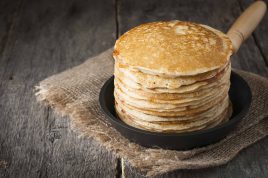Gluten Free Pancakes

A solid, tasty recipe for gluten free pancakes that will make them centre-stage at the table …
Gluten Free Pancakes
Serves: 6 Time: 10 minutes Level: Easy
Ingredients
- 125g gluten free flour (like Dove’s Farm)
- ½ tsp gluten free baking powder
- ½ tsp salt
- ½ cinnamon
- 1 tsp vanilla extract
- 2 egg
- 1 tbsp vegetable or olive oil, plus extra for frying
- 120ml of cold milk
Method
Combine the flour, baking powder, salt and cinnamon in a large mixing bowl.
Into a separate bowl, add the vanilla extract, egg and oil and mix thoroughly
Add the dry ingredients to the egg mixture and stir together with a spoon. The pancake batter will be lumpy.
Drop in and stir the milk. Add more milk if needed to make the batter smooth.
Heat the oil in a pan over a medium heat. Pour in 1-2 heaped tablespoons of the batter to make a small pancake. After 30 seconds, flip and repeat until cooked through.
Serve up with some of our fresh apples and other fruit, as well as our delicious locally-sourced honey.
Most Popular
- Three Delicious Ways to Cook Herring
- Fresh garlic: our guide on how to use it
- Courgette and beetroot salad
- CAULIFLOWER AND COURGETTE CURRY
- Cherry Crumble Bars
- Courgette Gratin
- VEGAN LEEK AND POTATO PIE
- Rhubarb and Chocolate Cake
- Banana Bread with Roast Chestnuts
- Beetroot and Chilli Soup
- SWEDE AND CHICKPEA CURRY
- Vegan Courgette Muffins
- Vegan Scotch Pancakes
- Broth (caldín)
- Coconut Shortcrust Pastry
